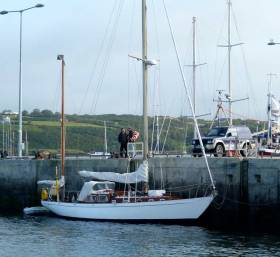Displaying items by tag: Laurent Giles
The keener Irish owners of classic wooden yachts with performance potential are already finalising plans for an interesting season writes W M Nixon. In it, their judiciously-chosen programme will include enough races against other classics to give a sense of purpose, yet not so much racing that it distorts their sailing and distracts them from the simple enjoyment of being aboard a comfortable and stylish classic yacht, which for many is really what it’s all about.
Taking this season gently, you could do the Lambay Classic at Howth on June 3rd, the Kingstown 200 Classic in Volvo Dun Laoghaire Regatta which runs overall from the 6th to the 9th July, though some classics and traditional craft are focusing more on the weekend aspect of it, and then there’s the 25th Anniversary Glandore Classics Regatta in West Cork from 23rd to 28th July.
Obviously with the passage from Dublin Bay to Glandore between July 9th and July 23rd, you get the best of it with a capable seagoing vessel which can do the voyage with time and more to spare, and there’s no doubt that this 1962-vintage Laurent Giles 42-footer fills the bill on that score.
As to on-board comfort, while we’re all turned on by the characteristically Jack Giles appearance of the boat, the photo which particularly took my eye was the sumptuously comfortable saloon, a classic of its time and type. And yes, the good ship Scythe comes with a proper heating system, so you can revel in that best of cruising comfort in warmth and dryness if West Cork – or for that matter Dublin Bay - serves up some unseasonably damp and cold weather.
One thing Scythe doesn’t come with is the mizzen mast with which she was designed. She has sailed for some years as a sloop, but if you’re going to be mingling with classic purists, you’ll need the boat to look as nearly as possible like the drawings which emerged from the tiny Giles design office at 4, Quay Hill, Lymington more than 55 years ago. So maybe the replacement costs for the mizzen could be a bargaining chip in discussing that €70,000 price tag. Scythe is for sale through Crosshaven Boatyard. Full advert here.





























































